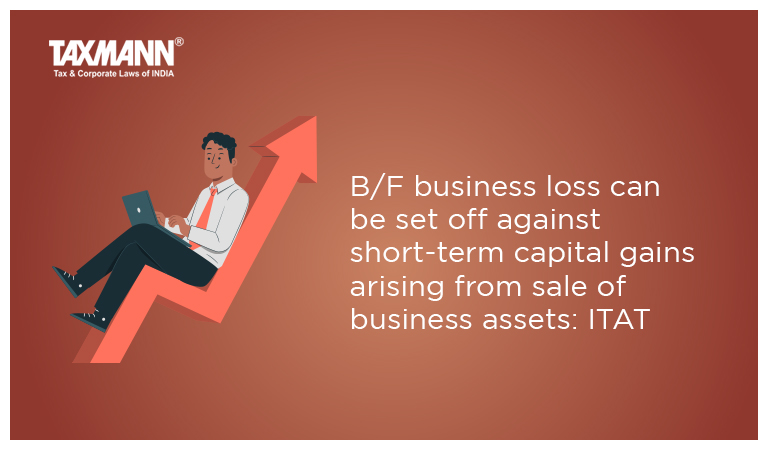B/F business loss can be set off against short-term capital gains arising from sale of business assets: ITAT
- Blog|News|Income Tax|
- 3 Min Read
- By Taxmann
- |
- Last Updated on 23 August, 2022

Case Details: Infinity Infotech Parks Ltd. v. PCIT - [2022] 141 taxmann.com 131 (Kolkata-Trib.)
Judiciary and Counsel Details
-
- A.T. Varkey, Judicial Member & Rajesh Kumar, Accountant Member
- Akkal Dudhwewala, FCA for the Appellant.
- Md. Atahar H. Choudhury, CIT for the Respondent.
Facts of the Case
The assessee was engaged in leasing IT parks developed by it to various IT companies and other companies for commercial purposes. When the constructed spaces were given on long-term leases, the assessee received lump sum lease premium which was reduced/adjusted from the block of ‘fixed assets’ in terms of the deeming fiction set out in section 43(6) read with section 50.
Accordingly, when the block of asset ceased to exist, the excess/gain arising after adjustment of the premium received from long-term leases from the WDV of the asset, was computed and shown by way of deemed ‘short-term capital gain’ under section 50. The assessee claimed set-off of brought-forward business loss of preceding years against this short-term capital gain. The Assessing Officer allowed the same.
Subsequently, the Commissioner invoked revision jurisdiction under section 263 on the ground that the set-off of brought forward business loss of earlier years against the short-term capital gain was irregular. The assessee filed the instant appeal before the Tribunal.
ITAT Held
The Tribunal held that the activity of leasing constructed spaces was undeniably the assessee’s core business activity. Hence, these properties constructed by the assessee were its ‘business asset’ reflected by way of ‘fixed asset’. The income derived from leasing these fixed assets had been taxed as ‘business income’.
Under the scheme of the Act, the income from grant of ‘long-term capital leases’ results in deemed transfer of fixed assets, and therefore by way of operation of deeming fiction set out in section 50, the excess/ gain over the WDV of the fixed asset has to be taxed as ‘short-term capital gain’.
It cannot be denied that the act of entering into ‘long term leases’ is the business activity of the assessee and the income, which is assessed by way of capital gain, bears the character of profits or gain derived from such leasing business.
Hence, irrespective of under which head such income is taxable (‘short-term capital gain’ in the instant case), the loss assessed under the head ‘profits & gains of business or profession’ in the preceding years and brought forward to the relevant year had been rightly claimed as set-off against the profits or gain derived from long term leases assessed under the head ‘short-term capital gain’.
List of Cases Reviewed
-
- CIT v. Cocanada Radhaswami Bank Ltd. [1965] 57 ITR 306 (SC) (para 13)
- CIT v. Hickson & Dadajee (P.) Ltd. [2020] 122 taxmann.com 94 (SC) (para 14)
- Digital Electronics Ltd. v. Addl. CIT [2011] 16 taxmann.com 316/[2012] 49 SOT 65 (Mum.-Trib) (para 16)
- Nandi Steels Ltd. v. Asstt. CIT [2021] 128 taxmann.com 267/281 Taxman 615/436 ITR 238 (Kar.) (para 17)
- Pr. CIT v. Alcon Developers [2021] 128 taxmann.com 371/432 ITR 277 (Bom.) (para 18)
- ITO v. D.G. Housing Projects Ltd. [2012] 20 taxmann.com 587/[2013] 212 Taxman 132 (Mag.)/[2012] 343 ITR 329 (Delhi) (para 24) followed.
List of Cases Referred to
-
- Malabar Industrial Ltd. v. CIT [2000] 109 Taxman 66/243 ITR 83 (Delhi) (SC) (para 4)
- CIT v. Cocanada Radhaswami Bank Ltd. [1965] 57 ITR 306 (para 6)
- CIT v. Hickson & Dadajee (P.) Ltd. [2020] 122 taxmann.com 94 (SC) (para 6)
- Nandi Steels Ltd. v. Asstt. CIT [2021] 128 taxmann.com 267/281 Taxman 615/436 ITR 238 (Kar.) (para 6)
- Digital Electronics Ltd. v. Addl. CIT [2011] 16 taxmann.com 316/[2012] 49 SOT 65 (Mum.-Trib) (para 6)
- Pr. CIT v. Alcon Developers [2021] 128 taxmann.com 371/432 ITR 277 (Bom.) (para 6)
- Radhasoami Satsang v. CIT [1992] 60 Taxman 248/193 ITR 321 (SC) (para 22)
- ITO v. D.G. Housing Projects Ltd. [2012] 20 taxmann.com 587/[2013] 212 Taxman 132 (Mag.)/[2012] 343 ITR 329 (Delhi) (para 24).
Disclaimer: The content/information published on the website is only for general information of the user and shall not be construed as legal advice. While the Taxmann has exercised reasonable efforts to ensure the veracity of information/content published, Taxmann shall be under no liability in any manner whatsoever for incorrect information, if any.

Taxmann Publications has a dedicated in-house Research & Editorial Team. This team consists of a team of Chartered Accountants, Company Secretaries, and Lawyers. This team works under the guidance and supervision of editor-in-chief Mr Rakesh Bhargava.
The Research and Editorial Team is responsible for developing reliable and accurate content for the readers. The team follows the six-sigma approach to achieve the benchmark of zero error in its publications and research platforms. The team ensures that the following publication guidelines are thoroughly followed while developing the content:
- The statutory material is obtained only from the authorized and reliable sources
- All the latest developments in the judicial and legislative fields are covered
- Prepare the analytical write-ups on current, controversial, and important issues to help the readers to understand the concept and its implications
- Every content published by Taxmann is complete, accurate and lucid
- All evidence-based statements are supported with proper reference to Section, Circular No., Notification No. or citations
- The golden rules of grammar, style and consistency are thoroughly followed
- Font and size that’s easy to read and remain consistent across all imprint and digital publications are applied



 CA | CS | CMA
CA | CS | CMA
